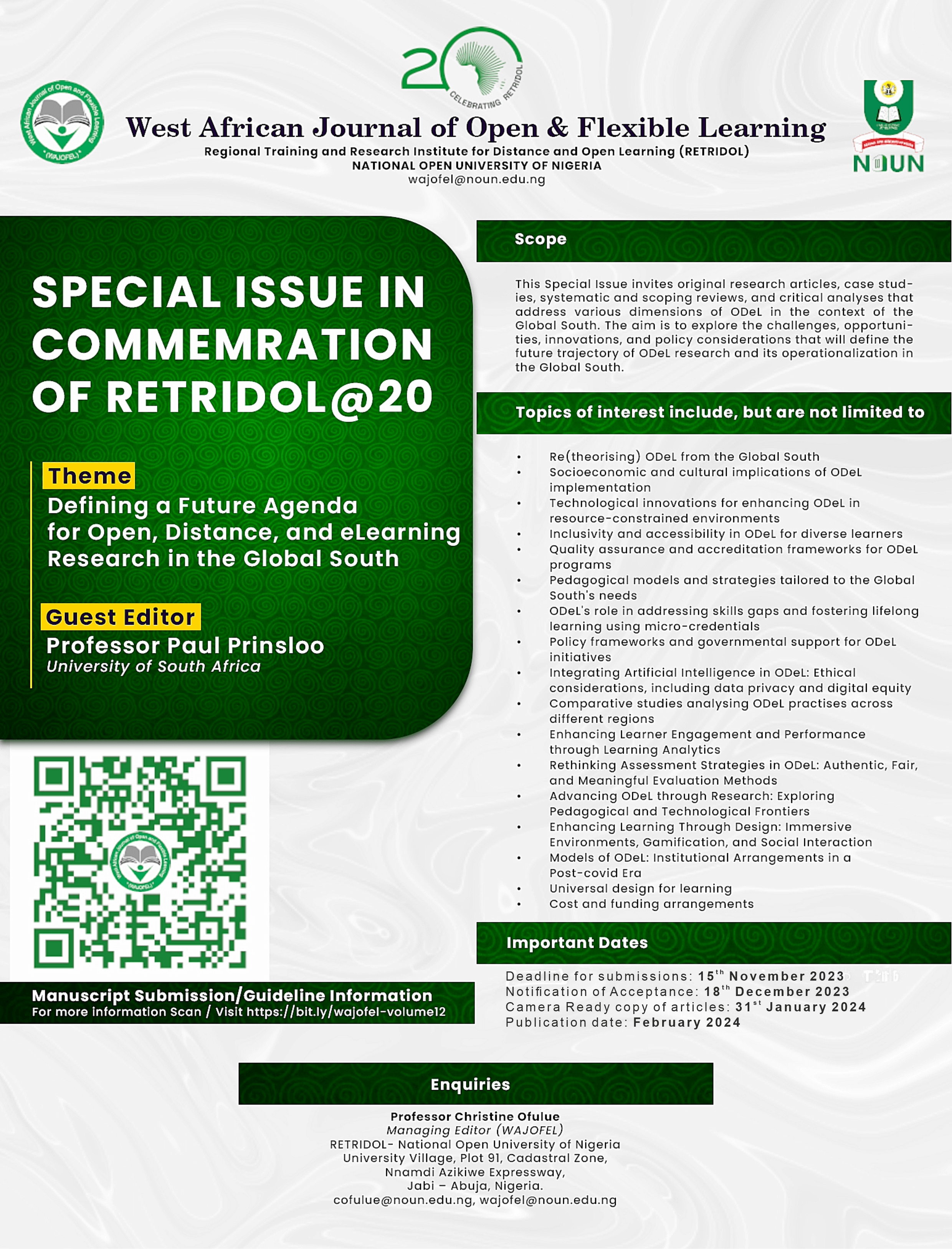Call for Papers – Special Edition, Volume 12, Number 2, 2024
Special Issue in Commemoration of RETRIDOL@20Special Edition, Volume 12, Number 2, 2024
Theme: Defining a Future Agenda for Open, Distance, and eLearning Research in the Global South
Guest Editor: Professor Paul Prinsloo, University of South Africa
Background:Open, Distance, and eLearning (ODeL) has emerged at the intersections of advances in technology and a commitment to provide educational opportunities for those who have traditionally been excluded from access to such opportunities and, increasingly, those who prefer the flexibility ODeL as a mode of delivery offers. As such, ODeL is committed to offering good quality, affordable and accessible education at scale, transcending geographical and transactional boundaries and redefining the way knowledge is imparted and acquired. In the context of the Global South, where diverse socioeconomic, cultural, and infrastructural challenges persist, ODeL offers a promising avenue to bridge educational gaps, empower marginalized individuals and communities, and contribute to sustainable development. However, the true potential of ODeL in the Global South is yet to be fully realised.
As we navigate the complexities of the 21st century, marked by rapid technological advancements, changing funding regimes, social, economic and political instabilities and unprecedented volatility, uncertainty, complexity and ambiguity, there is an urgent need to critically (re)examine and (re)imagine the role of ODeL in, not only, shaping the educational landscape of the Global South, but changing people’s lives.
This Special Issue seeks to initiate a scholarly dialogue that goes beyond the current state of ODeL and envisions a robust research agenda for its future in the Global South.
Scope:This Special Issue invites original research articles, case studies, systematic and scoping reviews, and critical analyses that address various dimensions of ODeL in the context of the Global South. The aim is to explore the challenges, opportunities, innovations, and policy considerations that will define the future trajectory of ODeL research and its operationalization in the Global South.
Topics of interest include, but are not limited to:
- Re(theorising) ODeL from the Global South
- Socioeconomic and cultural implications of ODeL implementation
- Technological innovations for enhancing ODeL in resource-constrained environments
- Inclusivity and accessibility in ODeL for diverse learners
- Quality assurance and accreditation frameworks for ODeL programs
- Pedagogical models and strategies tailored to the Global South’s needs
- ODeL’s role in addressing skills gaps and fostering lifelong learning using micro-credentials
- Policy frameworks and governmental support for ODeL initiatives
- Integrating Artificial Intelligence in ODeL: Ethical considerations, including data privacy and digital equity
- Comparative studies analysing ODeL practises across different regions
- Enhancing Learner Engagement and Performance through Learning Analytics
- Rethinking Assessment Strategies in ODeL: Authentic, Fair, and Meaningful Evaluation Methods
- Advancing ODeL through Research: Exploring Pedagogical and Technological Frontiers
- Enhancing Learning Through Design: Immersive Environments, Gamification, and Social Interaction
- Models of ODeL: Institutional Arrangements in a Post-covid Era
- Universal design for learning
- Cost and funding arrangements
Manuscript Preparation Guidelines:Authors should submit their manuscripts in compliance with the format stipulated below:
- Manuscripts should be prepared in British English.
- Submissions should be in Microsoft Office Word (.doc/.docx) file format. Times New Roman with a font size of 12 and single line spacing.
- The first page of the manuscript should contain the title, author’s name(s), institutional affiliation(s), email address and ORCiD identifier. Names should be written in the following order: FirstName, Initial, Surname.
- Titles and headings should start with the first letters in capitals and should not be numbered.
- Abstracts should be between 200 and 250 words, with three (3) to five (5) keywords below.
- Length of the manuscript: 4,000 to 6,500 words.
- Footnotes are not accepted. Endnotes may be included in the article just before the reference list.
- The first occurrence of abbreviated words should be provided in full with the abbreviation following in a bracket.
- References must follow the American Psychological Association (APA) style, 7th edition.
- All manuscripts are subject to an initial appraisal and plagiarism check by the editor. If found suitable, a double-blind, peer-review process is carried out by independent expert reviewers.
Manuscript Submission Information:Submission Site: https://wajofel.org/index.php/wajofel/about/submissions
Select Special Edition in the section drop-down menu.
Important Dates:
Deadline for submissions: 15th November 2023
Notification of Acceptance: 18th December 2023
Camera Ready copy of articles: 31st January 2024
Publication date: February 2024
Publication Fees:Manuscript Assessment Fee: ₦10,000:00 ($30) – non-refundable article review charge.
This fee is waived for submission from outside Nigeria.
The journal is available in both print and online formats. It can be accessed online free of charge. However, there is a $30 fee for print copies of the journal.
Enquiries:Professor Christine Ofulue
Managing Editor (WAJOFEL)
RETRIDOL- National Open University of Nigeria
University Village, Plot 91, Cadastral Zone,
Nnamdi Azikiwe Expressway,
Jabi – Abuja, Nigeria.
cofulue@noun.edu.ng, wajofel@noun.edu.ng


Okay